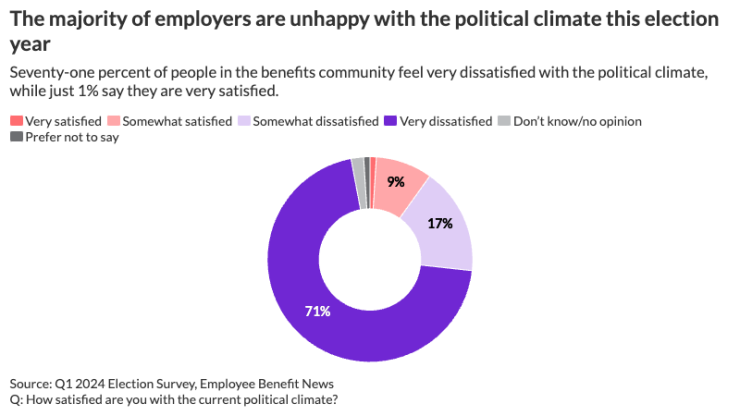Politics may have once been considered taboo at work, but now employees expect their offices to be somewhere they can engage in those types of conversations safely — and they want their
According to research by Employee Benefit News, 71% of survey respondents in a variety of professional services industries said they are very dissatisfied with the current political climate. And they're not keeping their opinions to themselves: 61% of employees say they've discussed politics at work in the last year, according to a recent survey from Glassdoor. However, data from resume-building platform ResumeNow found that nearly half of U.S. employees regret having these discussions, with 51% believing that discussing politics at work will have a negative
"The last few months have been very politically polarizing," says Preston Taylor, head of HR at industrial technology company Helios. "As a result, companies are really falling into two camps: Do they allow political discourse at work or not? And if they do, how do they allow it to happen?"
Read more:

As the boundary between work and life disappears,
And while it may seem safer to have employees avoid politics at work altogether, the way leaders handle tough conversations in the office will begin to play a huge role in the
"If you tell people that they can't do something, it only makes them want to do that that much more," Taylor says. "But you need to have guardrails and safeguards in place if you're going to allow that type of discourse to happen, especially at a time like this and in an election year."
To do this efficiently, employers will have to be
Read more:
"Help people understand that political discourse is not something that they have to participate in," Taylor says. "But if they do, remind employees that disagreements are okay and people are entitled to have different opinions as long as they're not forced on any one person."
Of course, being proactive also means
"It's important for companies to really provide safe and equitable avenues for their employees to get to know each other and understand different perspectives," Taylor says. "In the end, it creates a much healthier environment and a more highly-engaged company."






